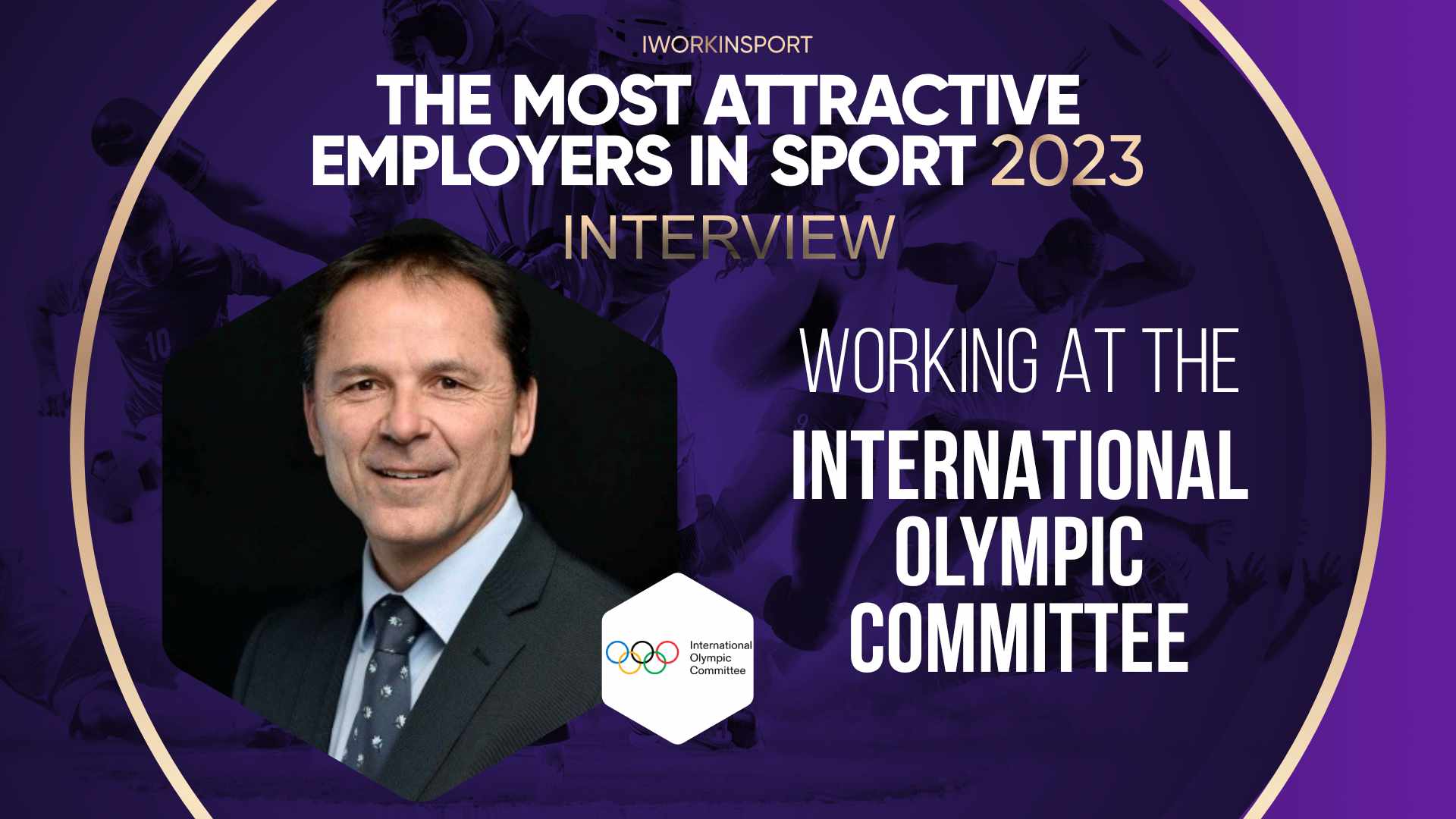Xavier Tissières is the Director of Human Resources at the International Olympic Committee. The IOC was named one of the Most Attractive Employers in Sport by a report published by iWorkinSport. This is one of five interviews with top recruiters in the industry featured in the publication.
The study surveyed more than 1,500 people from all continents, with the majority already working in sport, and asked them a simple question: “If you could choose to work anywhere in sport, where would that be?”
Initially, the respondents chose organisations divided into ten categories, and at the end, they indicated one single preferred choice, overall – the “Employer of their Dreams”.
The publication features rankings of the most attractive employers in sport divided in the following categories: Football Clubs, Sports Teams (other than Football), Sports Teams in the USA, Sports Leagues, Sports Governing Bodies, Event Organisers, Sports Marketing Agencies, Sponsors, Sporting Goods Companies and Sports Tech.
Additionally, the report presents the aspects that candidates rate as most important when deciding where they would like to work.
DOWNLOAD THE FULL REPORT HERE.
Interview with Xavier Tissières, Director of HR at the International Olympic Committee
The IOC has been a Top Employer in the MAES Survey for multiple years now. Why do you think it consistently finds itself so highly ranked?
- Prestige and Global Recognition: The IOC is a renowned international organisation responsible for overseeing and promoting the Olympic Games. Its global recognition and prestige make it an attractive employer for individuals passionate about sports, international relations, and cultural exchange.
- Commitment to Diversity and Inclusion: The IOC has placed a strong emphasis on diversity and inclusion in its workforce. It strives to create an inclusive environment that values individuals from various backgrounds, cultures, and perspectives. This commitment to diversity fosters a welcoming and supportive workplace culture.
- Employee Development and Growth Opportunities: The IOC prioritises employee development and growth by offering various training programs, mentorship initiatives, and career advancement opportunities. It invests in the professional and personal growth of its employees, providing them with the resources and support they need to excel in their roles.
- Work-Life Balance and Well-being: The IOC recognizes the importance of work-life balance and employee well-being. It promotes a healthy work environment by implementing policies and programs that support employee well-being, such as flexible working arrangements, wellness initiatives, and work-life balance initiatives.
- Collaborative and Team-oriented Culture: The IOC fosters a collaborative and team-oriented culture, encouraging employees to work together and share their expertise. This collaborative environment promotes innovation, creativity, and effective problem-solving.
- Commitment to Sustainability and Social Responsibility: The IOC is dedicated to sustainability and social responsibility, aiming to leave a positive impact on society and the environment. Its commitment to these values resonates with employees who are passionate about making a difference and contributing to a better world.
Overall, the IOC's consistent high ranking as a Top Employer in the MAES Survey can be attributed to its prestigious reputation, commitment to diversity and inclusion, focus on employee development, emphasis on work-life balance, collaborative culture, and dedication to sustainability and social responsibility. These factors combine to create a desirable workplace that attracts and retains top talent.
Employee desires and needs are changing. Can you speak to the changing trends you are seeing and how is the IOC evolving its HR strategies to address these needs?
Employee desires and needs have indeed been evolving, driven by various factors such as changing demographics, advancements in technology, and shifts in work expectations. Here are some changing trends in the employee landscape:
- Flexibility and remote work
- Focus on well-being
- Career development and learning opportunities
- Inclusive and diverse workplaces
- Purpose and social impact
In 2008, the IOC was ahead of its time, having already launched its first teleworking policy for its employees.
Revised in 2018 to bring it up to date, the implementation of the policy review was a great success and allowed the IOC, on 16 March 2020, when the COVID-19 measures came into force, to ensure that the organisation's employees were not professionally impacted.
The other four themes mentioned above have also been the subject of special attention since 2018, where policies have been created or updated, where information and training sessions have been launched for all employees.
We can always do better and improve in these areas because the situation is not perfect, but we can say that what has been put in place is a success because the attrition rate has remained low despite external temptations and the labour market situation.
The sports industry has become an extremely appealing career choice. As the industry continues to professionalise, what advice do you have to offer those trying to break into the industry?
Here is some advice I could give to people who would like to join this field of activity
- Gain Relevant Education and Knowledge: Acquire a strong educational foundation in fields related to sports management, marketing, communication, or business.
- Build a Network: Networking is crucial in the sports industry.
- Gain Practical Experience: Seek internships, volunteer opportunities, or part-time positions within sports organisations, clubs, or associations.
- Develop Specialised Skills: Identify specific areas within the sports industry that interest you and develop specialised skills in those areas.
- Embrace Opportunities for Professional Development: Stay updated on industry trends, best practices, and emerging technologies.
- Showcase Your Passion and Commitment: The sports industry values individuals who are genuinely passionate about sports. Let your enthusiasm shine through in your applications, interviews, and interactions.
- Be Proactive and Persistent: Breaking into the sports industry may require persistence and a proactive approach.
- Emphasise Transferable Skills: Identify transferable skills from your previous experiences that can be valuable in the sports industry.
- Stay Informed and Engaged: Stay updated on current events, trends, and news in the sports industry.
- Be Flexible and Open to Opportunities: Be open to starting at entry-level positions or taking on roles that may not be your ideal job initially.
Can you talk about the importance of ongoing education in the sports world? What do you like to see on the CVs of prospective employees regarding education?
Ongoing education is crucial in the sports world as the industry is constantly evolving, and new technologies, best practices, and trends emerge. Here are some reasons why ongoing education is important in the sports world:
- Keeping up with the latest trends and innovations: The sports industry is constantly changing, and staying up-to-date with the latest trends and innovations is essential for staying competitive.
- Developing new skills: Ongoing education can help individuals develop new skills and expertise in areas such as data analysis, social media, and technology.
- Advancing career opportunities.
- Demonstrating commitment to learning and growth.
When it comes to reviewing the CVs of prospective employees, I like to see evidence of relevant educational qualifications and any professional certifications related to the sports industry. I also look for indications of a willingness to learn and grow, such as participation in training programs or workshops.
At the IOC, we offer ongoing education opportunities for our employees to support their professional development. These include internal training programs, workshops, and online courses. We encourage our employees to take advantage of these opportunities and to stay informed and engaged in the industry. We also support our employees in pursuing external education opportunities, such as further education or professional certifications.
Overall, ongoing education is essential in the sports world, and investing in ongoing education can be a valuable asset for individuals and organisations alike.
Our research shows that the IOC does well at attracting talent. What strategies do you have in place to ensure you retain your best talent?
At the International Olympic Committee (IOC), we understand the importance of retaining our top talent to ensure the continued success and growth of our organisation. Here are some strategies we have in place to retain our best talent:
- Competitive Compensation and Benefits: We offer competitive compensation packages that are designed to attract and retain talented individuals.
- Professional Development and Growth Opportunities: We provide our employees with ample opportunities for professional development and growth.
- Recognition and Rewards: We believe in recognizing and rewarding our top performers. We have performance evaluation systems in place to acknowledge outstanding contributions and provide appropriate recognition.
- Work-Life Balance and Well-being Initiatives: We strive to create a supportive work environment that fosters a healthy balance between professional and personal life.
- Inclusive and Diverse Culture: We value diversity and inclusion, and we promote an inclusive culture where all employees feel valued and respected. We provide equal opportunities for growth and ensure that diversity is reflected at all levels of the organisation.
- Communication and Feedback: We provide regular opportunities for employees to provide feedback, share their ideas, and participate in decision-making processes. We value their input and actively seek to incorporate their suggestions and opinions into our policies and practices.
- Employee Engagement and Team Building: We foster a sense of community and belonging through various employee engagement initiatives and team-building activities. This includes social events, sports activities, volunteering opportunities, and collaborative projects that bring employees together and promote a positive work culture.
By implementing these strategies, we aim to create an environment where our top talent feels valued, supported, and motivated to contribute their best. Retaining our best talent is crucial for the long-term success of the IOC, and we continuously evaluate and improve our retention strategies to ensure the satisfaction and engagement of our employees.


